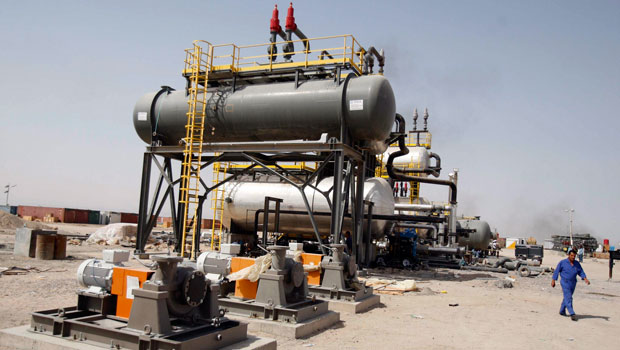Brent crude oil dipped below $100 a barrel on Tuesday on growing concern about a Greek debt default and the health of the global economy. Prices have tumbled from a 2011 peak of $127 reached in April.
“Oil prices have slumped to their lowest acceptable levels and it would be really difficult to accept prices below $90,” Iraq’s Hussain Al-Shahristani said.
He said he saw no need for the Organization of the Petroleum Exporting Countries to review its crude output at its next meeting, in December, and no reason at the current time to trim production.
In a further indication of concern about falling prices, an official from Iran raised the possibility of OPEC holding an emergency meeting, with its OPEC governor saying it would be a “natural” thing to do if prices continue to fall.
Iran holds the rotating presidency of OPEC until the end of this year. But Saudi Arabia, Kuwait and the UAE have shown no concern about prices and little appetite for an early meeting.
“At the moment the price of Brent and Dubai oil is around $100 and it is predicted that they will fall below $100,” Iran’s Mohammad Ali Khatibi said in a media interview.
“At the moment there is some surplus of supply in the market due to a drop in demand.”
OPEC is next scheduled to meet on Dec. 14 at its Vienna headquarters.
While OPEC does not have a formal target for oil prices, other officials in the 12-member group have made similar comments to Iraq pointing to $90 as a threshold level.
“For the time being until December, it’s wait and see,” said a delegate from one of OPEC’s African members.
“A price between $90 and $100, we can live with it. Below $90 is a little bit worrying.”
Saudi Arabia, Kuwait and the UAE, however, have so far shown no sign of concern about falling prices.
They boosted output unilaterally after African countries, Iran and Venezuela blocked a proposal to increase output targets at OPEC’s last meeting, which was held on June 8.
Having provided extra barrels to help offset the loss of Libyan supplies without a formal OPEC agreement, they are likely to reduce their output quietly if they decide there is too much oil in the market.
A Reuters survey found no sign of the Gulf members lowering supplies in September. Saudi Arabia’s oil minister, Ali Al-Naimi, said on Saturday the oil market was balanced, the SPA reported.
One senior official said recently that the Gulf producers were unlikely to reduce supplies to try to stem a decline in oil prices unless crude falls below $90 for a sustained period.
OPEC’s Gulf members are typically the organization’s most moderate on prices because they do not want high energy costs to restrict economic growth and curb long-term demand for their main source of export revenue.
Others like Iran, Venezuela and Algeria have lesser oil reserves and bigger populations and prefer to keep prices as high as possible.










